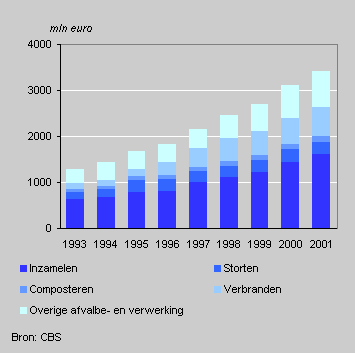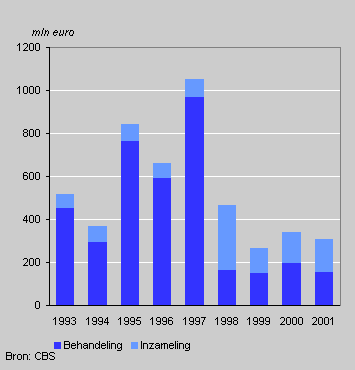Turnover increases for waste treatment plants

The Netherlands generates about 60 million ton of waste a year. Over 75 percent of the waste is re-used. The collection and processing of waste play a major role in private waste collection and waste processing plants.
13 percent more turnover each year
The turnover generated by these waste processing plants was 3.4 billion euro in 2001. This is ten percent more than in 2000. Since 1993 the annual turnover has been growing by an average of almost 13 percent. Higher collection and processing costs of waste, and the privatisation of municipal services are major reasons explaining the turnover increases.
Turnover of private waste processing plants

Collection and processing cost more
Waste collection and processing has become increasingly expensive in recent years. This is the result of the policy decisions to re-use as much waste as possible, and to discourage waste dumping. Moreover, waste processing is subject to stringent environmental regulations.
Separate waste flows
In order to make re-use possible, waste is collected in separate flows. Municipalities have been under the obligation to collect garden, fruit and vegetable waste separately since 1994.
Enterprises also supply their waste separately. Waste plants have been investing heavily in separate waste collection and subsequent processing.
Environmental regulations require substantial investment
Another reason to invest heavily is attributed to strict environmental regulations. New, expensive provisions were made to protect dumping grounds. Obsolete waste incineration plants were closed and replaced by new, modern provisions. Waste dumping is discouraged by raising dumping levies several times over.
Investments of private waste processing plants

Privatisation
Privatisation of municipal waste collection and processing is another reason for growth of this branch of industry in recent years. Municipal services were transformed to private companies (NV or BV) with or without government involvement. Furthermore waste collection and processing is contracted out to private companies by the municipalities and collective regulations. So turnover once attributed to the municipalities, is now contributing to the turnover of private enterprises.
Waste flight
Regulations are being prepared to open up the European waste market and to make it more competitive. The Netherlands has kept its borders closed in order to protect waste processing from unfair competition. Export licenses are granted for waste that can be usefully applied abroad. This kind of export is increasing substantially. The phenomenon is known as waste flight. The waste is mainly destined to Germany, where processing is cheaper. Waste processors have already reported the negative effects of waste flight on their turnover in 2002.
Fred Wentink and Rob Kuipers